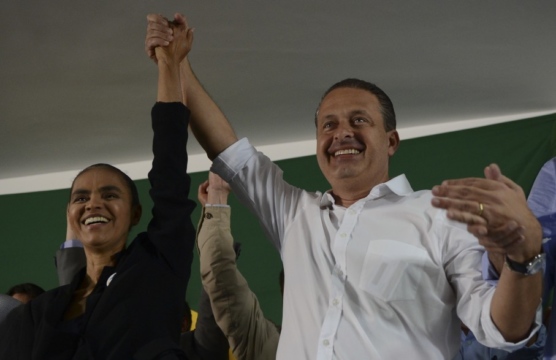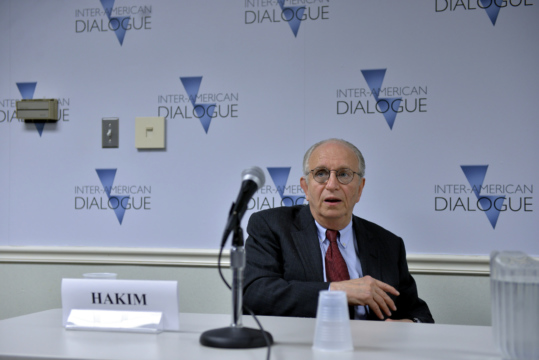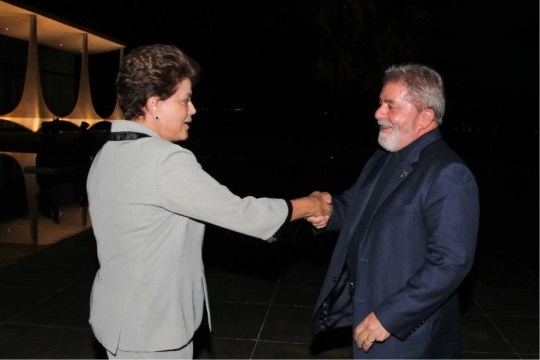
How Will Campos’ Death Affect Brazil’s Presidential Race?
Brazilian presidential candidate Eduardo Campos was killed when his jet crashed Wednesday in the city of Santos.
During a visit to Pittsburgh, Michael Shifter spoke with KQV News Radio and the World Affairs Council of Pittsburgh for their weekly World Affairs Report. In a conversation with Angélica Ocampo, Shifter discussed regional progress in Latin America, US foreign policy, the crisis in Venezuela and the upcoming elections in Brazil and Mexico.
“There is a lot of debate on the ‘current situation’ of the region because of its heterogeneity, so generalizations are risky.”
“[Progress] also depends on what you compare the region to. The Dialogue started in the 80s, during the ‘lost decade’ for Latin America, a terrible time for the region. If you compare it to that time, the region has gotten a lot better overall. There is a bigger middle class and with one or two exceptions Latin American countries are now democracies, but at the same time, some of the expectations that the region had in the 1990s with the end of the Cold War have not come to pass. The growth rate in the region is still pretty mediocre, and political institutions are still weak and are struggling. Corruption is still a big issue, crime is still a big issue, inequality is too wide, and most importantly, despite the progress made, the rest of the world is changing faster than Latin America. This gives us a mixed picture of the region.”
“There is a lot of bewilderment in Latin America towards the new administration. We haven’t seen anything quite like it. People are perplexed.”
“Latin Americans just can’t count on the US as a reliable partner, so they are looking elsewhere – China, India, South Korea, Japan, the European Union, etc. It is not a rejection to the US but pragmatism. This process was happening anyway, starting in January of this year but it has accelerated. Latin American countries are also working more closely among themselves.”
“China is already a major trading partner of Chile, Brazil and Peru. China has a very aggressive strategy, so if the US shows ambivalence or doesn’t show interest in the region, China is happy to fill that void. This is not a magical solution, China is obviously motivated by its own self-interest, and they do not invest in some of the regions that would need that investment most, but it is certainly a partner to watch.”
“It is a tragic situation; I think the deepest crisis in the hemisphere today. For a country with the largest oil reserves in the world this situation is quite stunning and hard to believe.”
“It is true that there is wide discontent and rejection towards the government, but the opposition has also struggled – yes, they are in difficult conditions but there are also differences within the opposition.”
“This is also a government that is very involved in criminal activity, in the drug trade, and with this tremendous oil economy a lot of them have benefited and they want to climb and stay in power.”
“What is going to happen next is a subject of discussion. One hopes that there is going to be some negotiation at some point […] Clearly if there were elections held at the national level, the government would lose, which is why they resist and they have been delaying any elections in Venezuela.”
“There are also more pessimistic scenarios, like the collapse of the government, the possibility of the military taking over, either with the military calling for elections or as a coup. One hopes there is going to be some serious negotiation and a government with some capacity to reduce the tremendous suffering that we are seeing in Venezuela.”
“The severity of the economic crisis and the tremendous debt problem are also key parts of this. There are a lot of experts who believe that Venezuela may be on the edge of default and it may have to restructure its debt, which could be a trigger to change the situation because a default-scenario is one that worries the Venezuelan government a great deal. So far China has helped them out and Russia is now playing a more important role, so this is not just a problem for a country, the region or the hemisphere, this is a global issue and it is part of the geopolitical chessboard.”
“Brazil is very confusing, very uncertain, and a rapidly changing situation. The President is facing corruption charges, and has 3% support in the polls, which is very hard to sustain. There are elections in October and he will finish his term, but he is extremely weak. This 3% also shows the disgust with the political class and the political establishment and the concern about corruption in Brazil.”
“What is interesting about Lula is that despite the corruption allegations he leads the polls for the next election. The question is whether he will be allowed to run again. A judge has to rule on that and most experts think he won’t be allowed to run, in which case it opens up the field. There are lots of figures out there and we may not even know right now the name of the next president of Brazil.”
“Clearly there is an anti-establishment, anti-politics sentiment that is extremely strong and that creates a lot of uncertainty.”
“The economy has marginally improved under Temer but it is not going to get back to where it was until we get over this political uncertainty.”
“Right now, Lopez-Obrador is ahead in the polls for the election in July 2018 and there is only one round. […] Lopez-Obrador is in a strong position because there is an anti-establishment mood, an anti-corruption mood, and the Trump attacks in Mexico probably play in his favor as well, so he is a real possibility.”
“The PRI is in trouble but they want to hold on to power and they are yet to pick their candidate, so this is going to play out in the future.”
Brazilian presidential candidate Eduardo Campos was killed when his jet crashed Wednesday in the city of Santos.
Na avaliação do presidente do Inter-American Dialogue, o novo governo contará com a boa vontade internacional e não terá problemas para estabelecer relações com os vizinhos.
When President Luiz Inacio Lula da Silva left office in January 2011, Brazil was widely regarded as Latin America’s gold standard for economic development and social progress. But today, with his handpicked successor, Dilma Rousseff, facing an impeachment trial, the country is viewed as an economic failure.
 Patrick Breitenbach / Flickr / CC BY 2.0
Patrick Breitenbach / Flickr / CC BY 2.0

